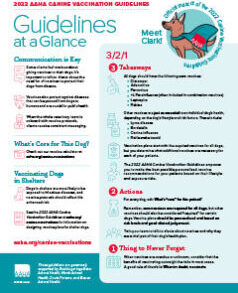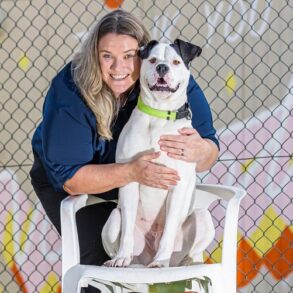“My dogs saved my life,” TV presenter Chris Packham tells Country Living. “I’ve been in some dark places. I was so miserable I didn’t want to be on this planet any longer, but my dogs took that choice away. They gave me the gift of purpose — and it’s the reason I’m still here.”
According to new research conducted by Rover.com to coincide with Mental Health Awareness Week (12th- 18th May 2025), one in five (21%) of people believe their dog has saved their life after significantly improving their mental health. While half (50%) say their dogs give them a reason to keep going.
For Chris, these statistics couldn’t be more true. “The bond with my Poodles was so strong that I couldn’t break it. I used to call my previous dogs ‘my joy grenades’. I’d let them off the lead, and they’d run for the sheer joy of running. It didn’t matter how miserable I was, that would always put a smile on my face,” he tells us from his home in the New Forest.
Dogs are an instant mood-boost, whether you have the joy of ownership or simply pass one on a walk. And they do more than just get you outside: previous studies found dogs lead to increased mental wellbeing, better physical health, lower risks of cardiovascular disease, increased immunity to allergies in children, and a reduction in social isolation.
The Springwatch presenter, who was diagnosed with Asperger’s Syndrome (part of the autism spectrum) at age 44, says autistic people can often have an even closer relationship with dogs. “I think it’s because we’re never judged. We are always accepted by that animal: the bonds are very tight.
“Dogs offer us unconditional love. They are always pleased to see us. We trust them implicitly. I sleep with my dogs, we eat the same thing. I have an enormous responsibility and duty of care to make sure that my dogs are happy and healthy.”
Rover.com has joined forces with Mental Health Mates to launch a series of mindful dog walks across the UK, helping more people access the comfort that dogs can bring.
“I’m not very good at starting conversations, but I will always chat to people if they come over and talk to me about my dog,” Chris tells us. “Dogs open conversations and start conversations.”
Data by the Samaritans found that males aged 45-49 years have the highest suicide rate in England (25.3 per 100,000), three times higher than the female rate.
“When I was younger, we just didn’t talk about mental health. Boys didn’t cry. We just didn’t talk about it. What I’ve learned is that, while your friends and family are the best people to care about you, they may not be the best people to care for you. What they can do is encourage you to get professional help. That can’t happen unless you’re talking about it.”
Chris recently worked with Lincoln University, looking at a specific cohort of autistic people. What he found was deeply powerful.
“A significant percentage of people in the study said the dogs had saved their lives when they were suicidal. When we asked them why, they said because they couldn’t leave the dogs behind. There wouldn’t be someone there to look after them.”
Growing up in leafy Southampton, Chris spent much of his childhood exploring the glorious green spaces surrounding his home and developed a deep-rooted fascination with the natural world.
“I thought I was going outside to see where everything in nature lived, but it was more than that. As an undiagnosed autistic person in the 60s and 70s, what I was finding outside was relief. I wasn’t being judged or compared. Nature provides us with a natural health service,” he adds, saying that being outside is where he feels he belongs.
Chris is often on-the-go for work, but there’s one place in the UK he feels most connected to: Shell Beach on the Isle of Purbeck. “I like going there in winter,” he tells us, though recommends bringing a coat.
“I’ve taken all the dogs I’ve ever owned to Shell Beach, so there’s a very strong emotional connection there. When I go there, I know I’ll be confronted with thinking about the dogs who are no longer with me. It’s a very personal place.”
For more information about Mental Health Mates, visit rover.com/uk. If you have been affected by any of the topics in this article, please call the Samaritans on 116 123.
Deputy Daily Editor, Country Living and House Beautiful
Lisa Joyner is the Deputy Daily Editor at House Beautiful UK and Country Living UK, where she’s busy writing about home and interiors, gardening, dog breeds, pets, health and wellbeing, countryside news, small space inspiration, and the hottest properties on the market. Previously, she has written for Conde Nast Traveller, House & Garden and Marie Claire magazine. Lisa studied at University For The Creative Arts, where she completed a BA in Fashion Journalism.
This post was originally published on this site be sure to check out more of their content.











































